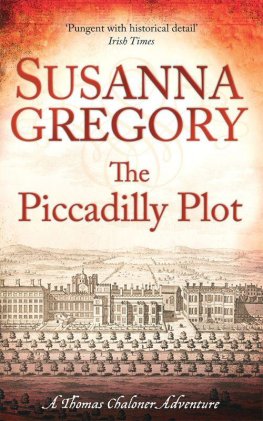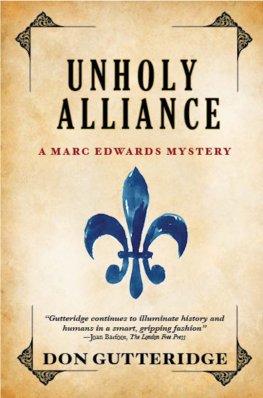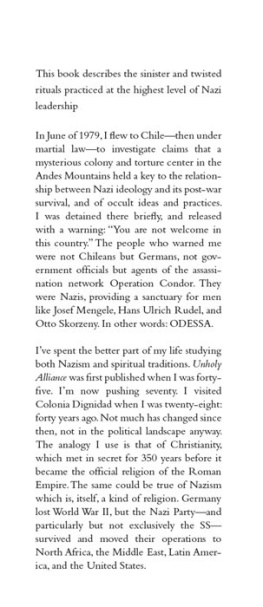Susanna Gregory - An Unholy Alliance
Here you can read online Susanna Gregory - An Unholy Alliance full text of the book (entire story) in english for free. Download pdf and epub, get meaning, cover and reviews about this ebook. genre: Detective and thriller. Description of the work, (preface) as well as reviews are available. Best literature library LitArk.com created for fans of good reading and offers a wide selection of genres:
Romance novel
Science fiction
Adventure
Detective
Science
History
Home and family
Prose
Art
Politics
Computer
Non-fiction
Religion
Business
Children
Humor
Choose a favorite category and find really read worthwhile books. Enjoy immersion in the world of imagination, feel the emotions of the characters or learn something new for yourself, make an fascinating discovery.

- Book:An Unholy Alliance
- Author:
- Genre:
- Rating:5 / 5
- Favourites:Add to favourites
- Your mark:
- 100
- 1
- 2
- 3
- 4
- 5
An Unholy Alliance: summary, description and annotation
We offer to read an annotation, description, summary or preface (depends on what the author of the book "An Unholy Alliance" wrote himself). If you haven't found the necessary information about the book — write in the comments, we will try to find it.
An Unholy Alliance — read online for free the complete book (whole text) full work
Below is the text of the book, divided by pages. System saving the place of the last page read, allows you to conveniently read the book "An Unholy Alliance" online for free, without having to search again every time where you left off. Put a bookmark, and you can go to the page where you finished reading at any time.
Font size:
Interval:
Bookmark:
Susanna Gregory
An Unholy Alliance
In 1350 the people of Cambridge are struggling to overcome the effects of the Black Death. Bands of outlaws roam the land and the high death rate among priests and monks has left the people vulnerable to sinister cults that have grown up in the wake of the plague. At Michaelhouse Matthew Bartholomew is training new physicians to replace those who died of the pestilence. When the body of a friar is found in the massive chest where the University stores its most precious documents, Bartholomew is dragged away from his teaching to investigate. But the friar's is not the only unexplained death in town. Almost by chance Bartholomew stumbles across a derelict church, abandoned since its congregation were decimated by the plague. It is now the meeting place for a mysterious sect which holds its followers in terror, and which Bartholomew believes to be at the very heart of an astonishing web of blackmail and deceit aimed to overthrow the established religion.
1
Cambridge, 1350
Isobel Watkins glanced fearfully behind her for at least the fourth time since leaving the home of the wealthy merchant on Milne Street. She was sure she was being followed, but each time she stopped and looked behind her, she could hear and see nothing amiss. She slipped into a doorway and held her breath to control her trembling as she peered down the dark street behind her. There was nothing, not even a rat scurrying from the mounds of rubbish that lined both sides of the High Street.
She took a deep breath and leaned her head back against the door. She was imagining things, and the recent murder of two of her colleagues in the town had unnerved her. She had never been afraid of walking alone in the dark before: indeed, it was usually when she met her best customers. She poked her head out and looked down the street yet again. All was silence and darkness. In the distance she heard the bell of St Michael's chiming the hour: midnight.
Dismissing her fears, she slipped out of the doorway and began walking quickly up the High Street towards her home near the town gate. It was only a short walk, and the night-watchmen on duty at the gate would be within hailing distance soon. She grimaced. It would not be the first time she had been forced to give her night's earnings to the guards in order not to be arrested for breaking the curfew. She caught her breath again as she heard the faintest of sounds behind her, and decided she would be happy to part with an entire week's earnings just to be safely in her own bed.
She saw the pinprick of light coming from the gate, and broke into a run, almost crying in relief. She was totally unprepared for the attack that came from the side. She felt herself hurled to the ground as someone dived out of the small trees around St Botolph's Church. She tried to scream as she felt herself dragged into the churchyard, but no sound would come. She felt a sudden burning pain in her throat and then a hot, sticky sensation on her chest. As her world slowly went black, she cursed herself for being so convinced that she was being followed that she had failed to consider whether it was safe ahead.
A short distance away, a man wearing the habit of a Dominican friar knelt in the silence of the tower of St Mary's Church. In front of him stood the great iron-bound box that held the University's most precious documents deeds of property, records of accounts, scrolls containing promises of money and goods, and a stack of loose pages recording important occurrences in the University, carefully documented by the University clerks.
The University chest. The friar rubbed his hands and, balancing the merest stub of a candle on the chest, began to work on one of the three great locks that kept the University's business from prying eyes. The only sounds in the tower were tiny clicks and metallic scrapes as he concentrated on his task. He felt safe. He had spent several days in the church, kneeling in different parts so he could become familiar with its layout and routine.
That night he had hidden behind one of the pillars when the lay-brother had walked around the church, dousing candles and checking all the windows were secure. When the lay-brother had left, the friar had stood stock still behind his pillar for the best part of an hour to make certain that no one had followed him and was also hiding. Then he had spent another hour checking every last corner of the church to make doubly sure. He had climbed on benches to test that the locks on the window were secure and had taken the added precaution of slipping a thick bar across the door before climbing the spiral stairs to the tower.
He hummed to himself as he worked. The singing that evening had been spectacular, with boys' voices soaring like angels over the drone of the bass and tenor of the men. The friar had been unfamiliar with the music and had been told it had been written by a Franciscan called Simon Tunstede who was earning something of a reputation as a composer. He paused and stared into the darkness as he tried to recall how the Sanctus had gone. As it came back to him, he resumed his fiddling with the lock and sang a little louder.
The first lock snapped open, and the friar shuffled on his knees to the next one. Eventually, the second lock popped open and the friar moved onto the third. He stopped singing and small beads of sweat broke out on his head. He paused to rub an arm over his face and continued scraping and poking with his slivers of metal.
Suddenly, the last lock snapped open, and the friar stood up stiffly.
He stretched his shoulders, cramped from hunching over his work, and carefully lifted the lid of the great box. It groaned softly, the leather hinges protesting at the weight. The friar knelt again and began to sort carefully through the documents that lay within. He had been working for only a few moments when a sound behind him made him leap to his feet. He held his breath in terror, and then relaxed when he realised it was only a bird in the bell chamber above. He turned back to the chest again, and continued to rifle through the scrolls and papers.
He suddenly felt a great lurching pain. He tried to stand up, but his legs failed him. He put both hands to his chest and moaned softly, leaning against the great box as he did so. He was aware that the light from the candle was growing dimmer as the pain in his chest increased. With the tiniest of sighs, the friar collapsed over the open chest and died.
2
Dawn was cool and clean as Matthew Bartholomew and Brother Michael walked together across the College yard to the great iron-studded doors that led to Foul Lane. As Michael removed the stout wooden bar from the wicket gate and chided the rumpled porter for sleeping when he should have been alert, Bartholomew looked up at the dark blue sky and savoured the freshness of the air. When the sun became hot, the small town would begin to stink from the refuse and sewage that were dumped in the myriad of waterways, ditches, and streams. But now the air was cool and smelt of the sea.
Michael opened the gate, and Bartholomew followed him into the lane. The large Benedictine tripped over a mangy dog that was lying in the street outside, and swore as it yelped and ran away towards the wharves on the river bank.
'There are far too many stray dogs in Cambridge,' he grumbled. 'Ever since the plague. Stray dogs and stray cats, with no one left to keep the wretched things off the streets.
Now the Fair is here, there are more than ever. And I am certain I saw a monkey in the High Street last night!'
Bartholomew smiled at the monk's litany of complaints and began to walk up the lane towards St Michael's Church. It was his and Michael's turn to open the church and prepare it for the first service of the day. Before the plague had swept through England, all the religious offices were recited in the church by the scholars of Michaelhouse, but the shortage of friars and priests to perform these duties meant that the College's religious practices were curtailed. Brother Michael would pray alone, while Bartholomew prepared the church for Prime, which all the scholars would attend.
Font size:
Interval:
Bookmark:
Similar books «An Unholy Alliance»
Look at similar books to An Unholy Alliance. We have selected literature similar in name and meaning in the hope of providing readers with more options to find new, interesting, not yet read works.
Discussion, reviews of the book An Unholy Alliance and just readers' own opinions. Leave your comments, write what you think about the work, its meaning or the main characters. Specify what exactly you liked and what you didn't like, and why you think so.



